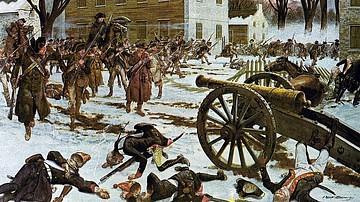Search
Search Results

Definition
Robert E. Lee - General-in-Chief of the Southern Confederacy
Robert E. Lee (1807-1870) was the most prominent Confederate general of the American Civil War (1861-1865), who commanded the Army of Northern Virginia for much of the war and was named general-in-chief of all Confederate forces in 1865...

Definition
John Quincy Adams
John Quincy Adams (1767-1848) was an American statesman and diplomat who served as the sixth president of the United States (1825-1829). The son of a former president, Adams had a long and distinguished political career both before and after...

Definition
Mercy Otis Warren
Mercy Otis Warren (1728-1814) was an American poet, playwright, and activist during the era of the American Revolution (1765-1789). Through her works of political satire, she advocated for the Patriot cause and became acquainted with several...

Article
France’s 1905 Law of Separation of Church and State
The 1905 Law of Separation of Church and State was enacted as the climax of decades of conflict between monarchists and anticlerical Republicans who viewed Christianity as a permanent obstacle to the social development of the Republic. The...

Definition
Women's March on Versailles
The Women's March on Versailles, also known as the October March or the October Days, was a defining moment in the early months of the French Revolution (1789-1799). On 5 October 1789, crowds of Parisian market women marched on Versailles...

Article
Weapons in the American Revolution
The American Revolutionary War (1775-1783) was a long and bitter conflict fought between Great Britain and its thirteen North American colonies over the Americans' liberties and, eventually, for the independence of the United States. The...

Article
Battle of Trenton
The Battle of Trenton (26 December 1776) was an important battle of the American Revolutionary War (1775-1783). On Christmas Day 1776, General George Washington led his Continental Army across the Delaware River to launch a surprise attack...

Article
Battle of Fort Washington
The Battle of Fort Washington (16 November 1776) took place during the American Revolutionary War (1775-1783) as part of the British effort to seize control of Manhattan Island. It saw a British and Hessian force capture Fort Washington...

Article
Saratoga Campaign
The Saratoga Campaign (20 June to 17 October 1777) was one of the most important military campaigns of the American Revolutionary War (1775-1783), in which a British army under General John Burgoyne invaded the Hudson River Valley but was...

Definition
Frederick Douglass - American Visionary
Frederick Douglass (circa 1818-1895) was an abolitionist orator, minister, writer, editor, reformer, and statesman, who had been born a slave in Maryland, escaped to New York at around the age of 20, and became a talented orator and writer...